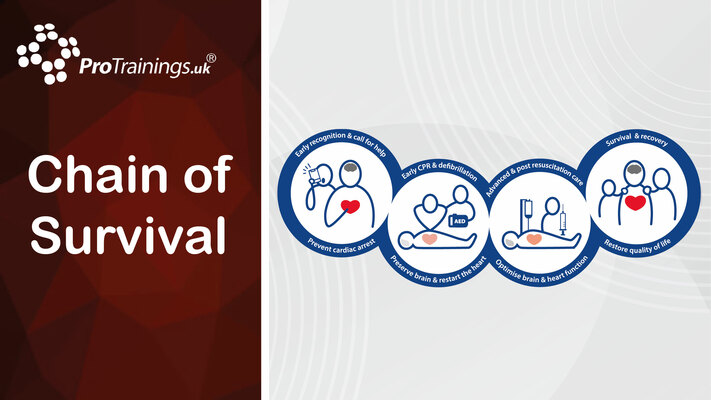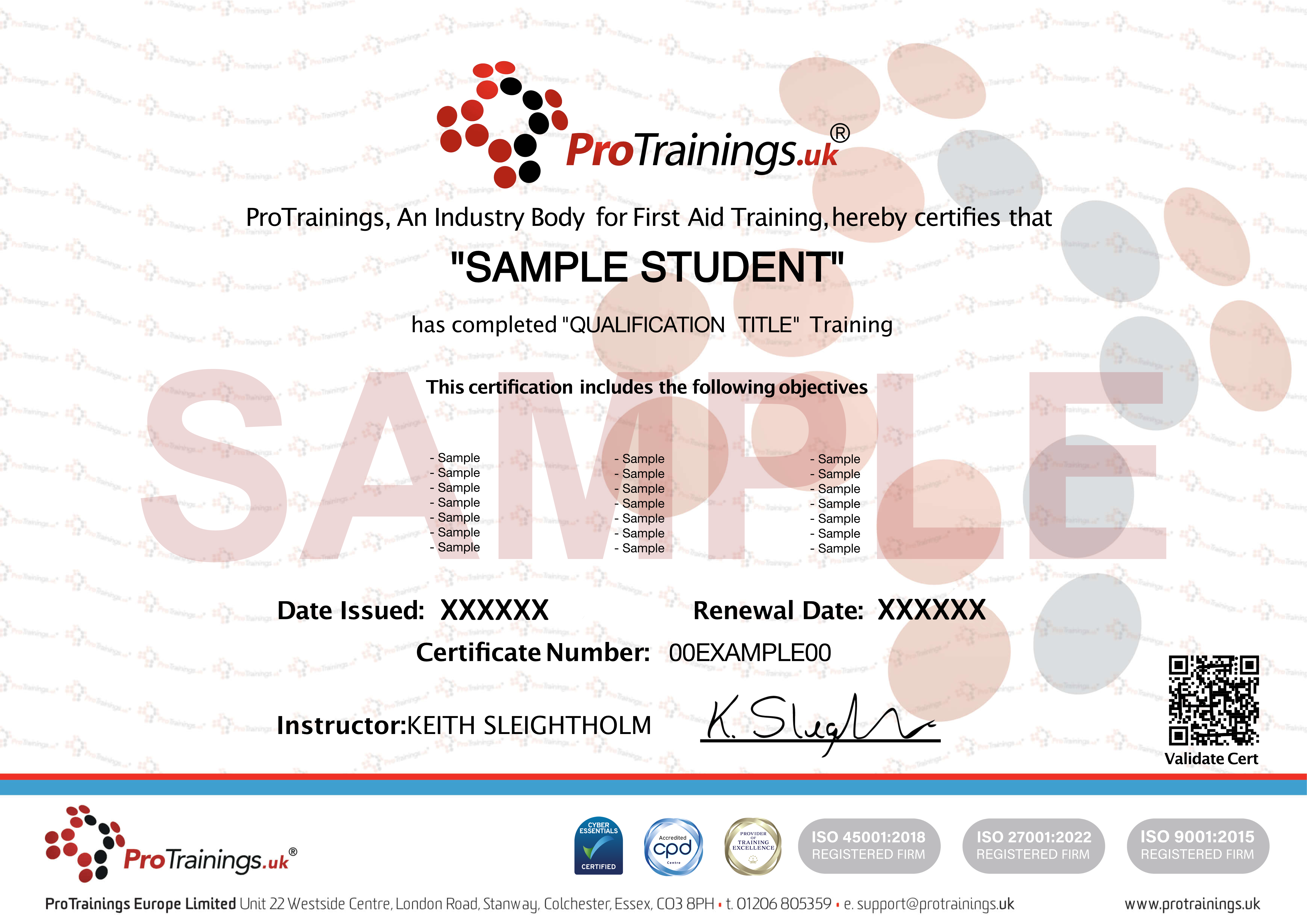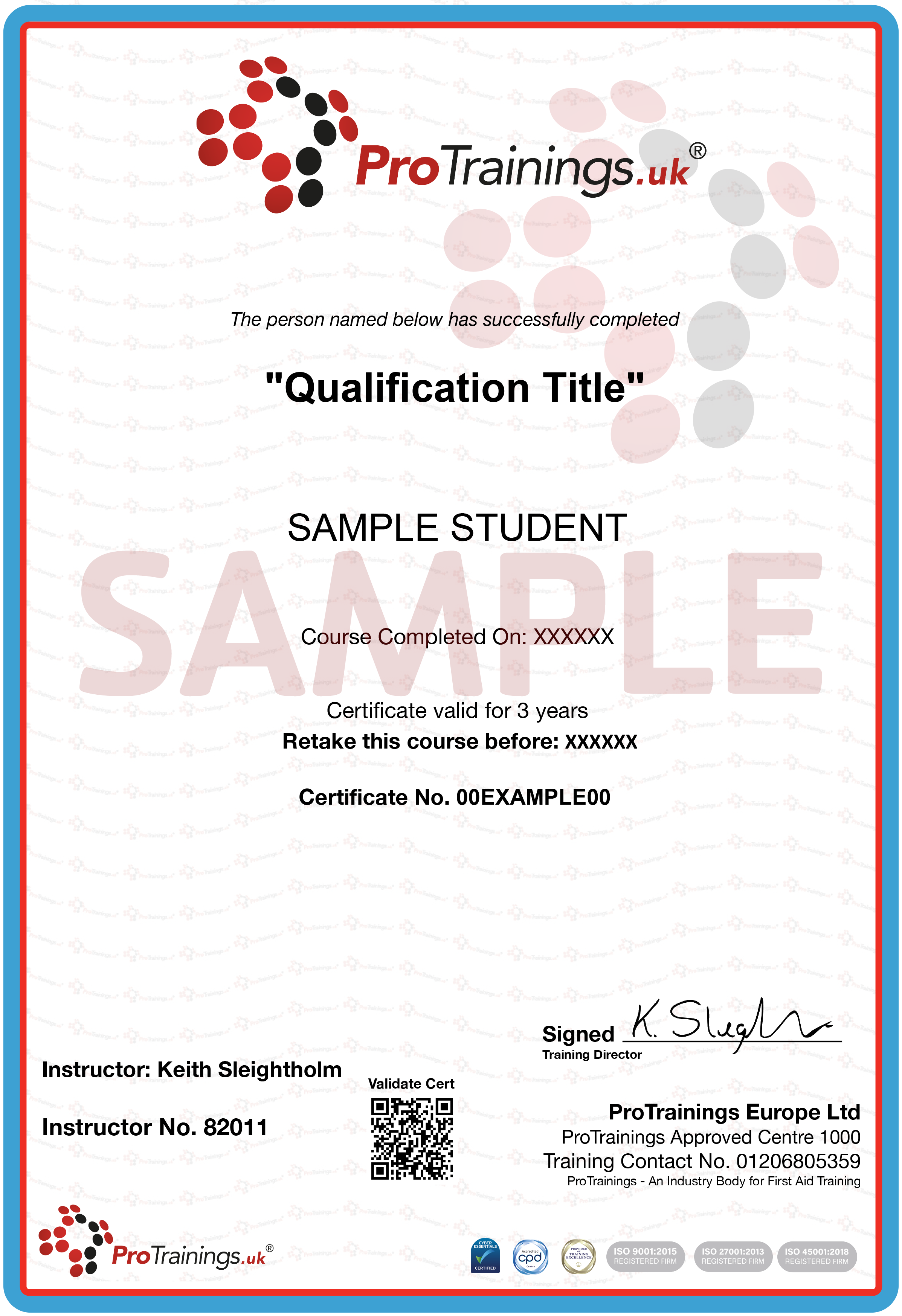Care Certificate
Online & Classroom Training Course

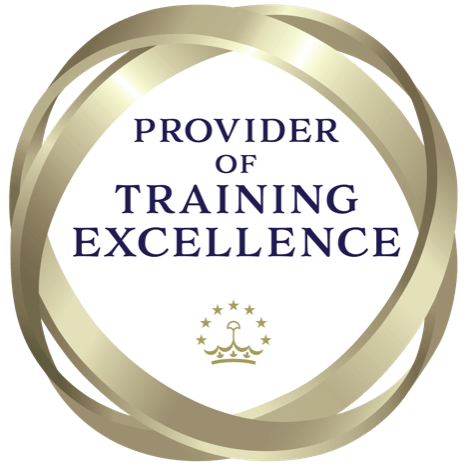
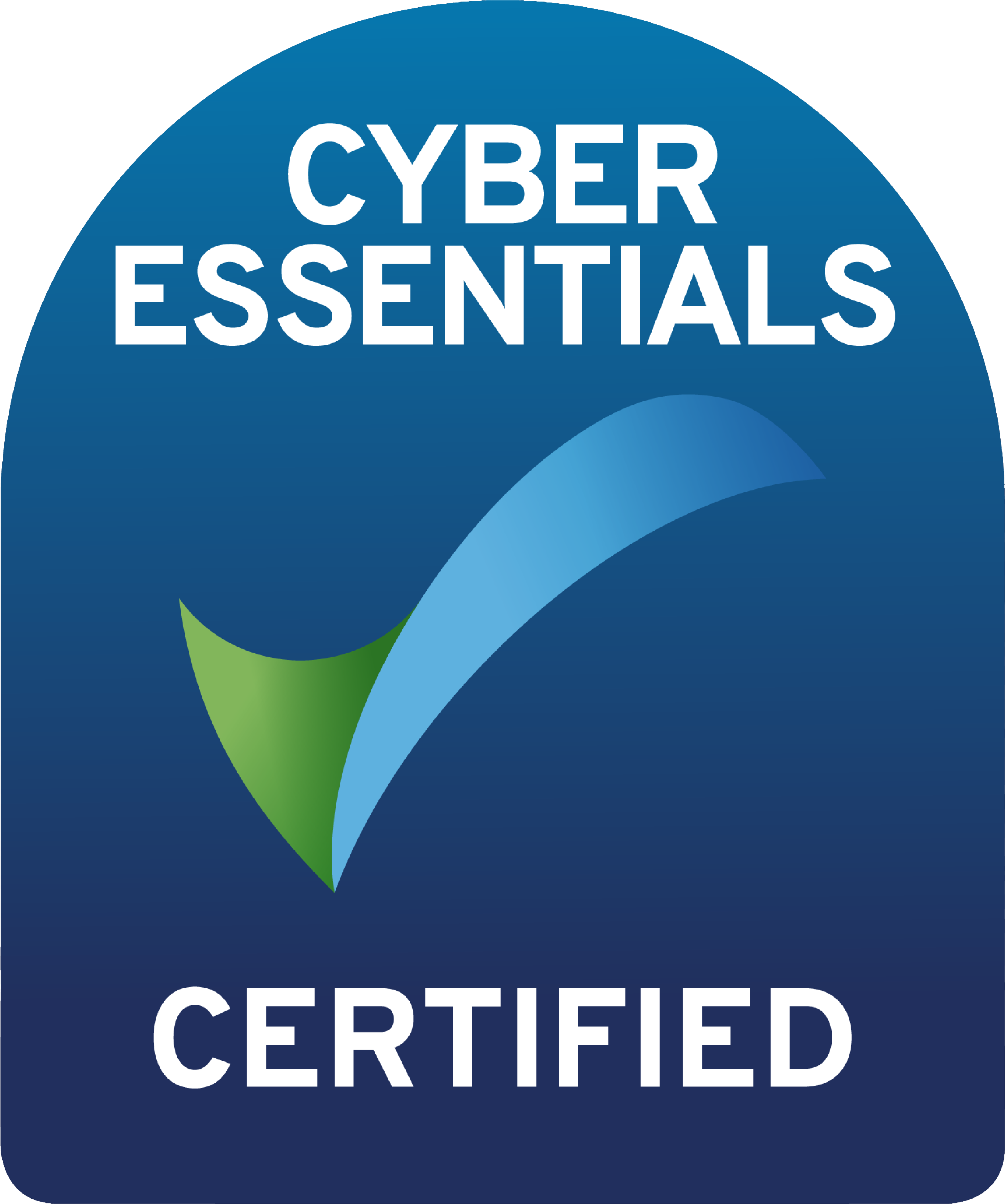
Video Playtime
12 hours and 50 minutes
Video Count
296 videos
Audio
English
Captions
English
Proof of Completion
Certificate
This Course Includes:
- Evidence Based Training Certificate
- Instant printable wall certificate
- 24/7 on-demand video
- Access on mobile
- Weekly refresher video
- Expiration reminder
- Student manual
over 3 million certifications issued to date
Why ProTrainings?
Convenience
Train Anywhere, On Any Device
Master Quality
Expert Instructors for Every Subject
Speed
Same-Day Completion
Trusted
Compliant & Secure
Who needs Health and Social Care training?
Most people take Health and Social Care training as a requirement for their job or for their personal life. Whether you work in healthcare or another profession or are simply looking for a new qualification, ProTrainings has the course that is suitable for you! Online courses allow you to train at your own pace, in your own time.
Some professionals that may need a Health and Social Care course include:
- Care workers
- Nurses
- Social care
- Health care assistants
- Assistant practitioners
- Care, support workers
- Anyone supporting clinical roles in the NHS where they have direct contact with patients
- Home care workers
- Porters
- Volunteers
- Cooks
- Drivers
More about this course
Certificate Validation: This course primarily focuses on the theoretical aspects of the Care Certificate. To successfully complete this certification, learners are required to demonstrate their practical skills in a workplace setting and receive validation from a qualified individual. This involves completing our online course and subsequently presenting your certificate and mapping document to your manager, who will coordinate the competency validation process in your workplace.
The certificate holds a lifelong validity, although we strongly recommend annual refresher training to ensure the ongoing maintenance of your competency. Your commitment to staying up-to-date is greatly appreciated.
Our Care Certificate course is designed to equip new employees with the essential knowledge and skills needed to excel in the care sector. Covering all 16 standards and recommendations set out by Health Education England, Skills for Care, and Skills for Health, this programme provides a strong foundation for your career.
Throughout the course, you will work through the knowledge-based units and receive comprehensive, evidence-based learning statements to track your progress. Combined with the final exam, this ensures a thorough understanding of all topics covered.
We provide a training portfolio to document your learning journey during the Care Certificate programme, supporting your ongoing professional development. In addition, delegates receive a tracking document enabling care managers to verify the completion of competency-based units, ensuring all practical requirements are met before the Care Certificate is awarded.
The Care Certificate is a mandatory qualification for anyone entering the care profession. Ideally, it should be completed before starting work and must be achieved within twelve weeks of employment. It is equally suitable for existing staff wishing to refresh or enhance their skills.
Our online course includes an optional local practical module for hands-on skills practice. We can also combine classroom-based and online qualifications to expand knowledge and create bespoke training packages. Where required, we can arrange nationally recognised practical sessions to complement your learning.
We are committed to supporting your training needs in the care sector and offer a range of regulated qualifications that can be integrated seamlessly into your Care Certificate training package.
Care Certificate Recommendations
Health Education England, Skills for Care, and Skills for Health collaboratively put forth several recommendations, which were subsequently approved by the Department of Health Governance Assurance Board:
-
Standards Retained with Amendments: The 16 standards are to be retained, albeit with some modifications.
-
Completing All 16 Standards: To earn the Care Certificate, individuals will need to successfully complete all 16 standards.
-
Priority for New Staff: Employers are encouraged to prioritise the Care Certificate for new staff members who are new to the care sector.
-
12-Week Timeframe: The recommended timeframe for full-time individuals to complete the Care Certificate remains at 12 weeks.
-
Employer Responsibility for Quality Assurance: Employers will bear the responsibility for ensuring the minimum level of quality assurance for the Care Certificate and the certification process itself.
-
Supportive Materials: To facilitate implementation, a variety of materials will be made readily available for employers to freely download and use. These resources are designed to aid in the successful adoption of the Care Certificate.
-
Individual Standards as Single Courses: Additionally, we offer each of the 16 standards as individual courses to provide flexibility in learning.
-
Replacing Previous Standards: The Care Certificate serves as a replacement for both the Common Induction Standards and the National Minimum Training Standards.
For further information regarding the Care Certificate, please feel free to reach out to Skills for Care.
We encourage companies, organisations, or agencies to get in touch with us to explore group discounts and learn more about onsite training options. Additionally, our system can be utilised to effectively track and monitor the training progress of your staff. Your staff's development is our priority, and we are here to support you in achieving your training goals.
- Student Manual (V8.1) - Fire Safety
- Student Manual (V8.1) - Health and Safety
- Student Manual (V8.1) - Moving and Positioning of People
- Student Manual (V8.1) - SOVA
- Student Manual (V8.3) - Infection Control
- Student Manual (V8.4) - Food Hygiene - English
- Student Manual (V9.0) - CPR/Basic Life Support
- Student Manual (V9.0) - First Aid Plus
- 5 ‘Rights’ of Administering Medications Safely link to document on the WHO website
- Adolescent CPR Flowchart handout/poster
- Adult CPR Flowchart
- Adult CPR Flowchart handout/poster
- Alzheimer's Society website link
- CQC website link
- Cae Inspectorate Scotland website link
- Care Certificate 2025 Guidance
- Care Certificate Mapping Document
- Care Certificate Self-Assessment Tool
- Care Information Scotland website link
- Catastrophic bleeding and trauma First Aid Guidance From ProTrainings.
- Child CPR Flowchart
- Child CPR Flowchart handout/poster
- Child and Infant CPR Flowchart Handout
- Clean hand techniques leaflet
- Cleaning colour coding in the NHS poster
- Coronavirus (COVID-19) - link to the NHS website
- Dementia UK website link
- Essentials of health and safety at work link to HSE website
- Find out what other courses are available as video online, blended and classroom courses nationally - our course finder
- Food Safety Agency website
- Free student first aid program leaflet
- Getting to Grips with Manual Handling link to HSE website
- Glossary of terms used in the care sector
- Government Advice - Best Practice Hand Rub
- HSE 5 steps to Risk Assessing link to HSE website
- HSE First Aid at Work Regulations
- HSE Manual Handling Regulations Guide - link to HSE website
- HSE guide to PPE
- HSE leaflet on Getting to grips with hoisting people and check list
- HSE leaflet on How the Lifting Operations and Lifting Equipment Regulations apply to health and social care
- HSE leaflet on lone working
- HeartSine 350 Information Leaflet
- Heartsine 350 AED unit leaflet
- Home Emergency Contact Sheet
- How to register to call EMS by text
- Infant CPR Flowchart
- Jext patient Information Sheet
- Link to ICO Website
- Link to our Concussion ad Brain injury course in association with Headway, a head injury charity
- Link to the HSE website
- MAR chart example
- Manual Handling Assessment Chart Guide to MAC - link to HSE website
- Mental Capacity Act (2005) Deprivation of Liberty Safeguards: England 2015-16, Official Statistics
- NHS Choices Web link
- Oxygen User Instructions - Gas rentals are available from ProTrainings, contact us for more information
- ProTrainings - Using an AED Leaflet
- ProTrainings Defibrillator eGuide
- RIDDOR link to the HSE guide
- Sign up for free Student First Aid - use code SCH-376-61-571
- Skills for Care Website
- Student Manual (V8.3) - Food Hygiene - Hindi
- Student Manual (V8.6) - Anatomy and Physiology Human Body
- The Regulatory Reform (Fire Safety) Order 2005
- Visit the First Aid Show free for first aid and medical videos
- Web link to the Joint Epilepsy Council website - JEC
- Workplace Accident Book
- Workplace Emergency Contact Sheet
- Woundclot - haemostatic gauze for all types of bleeding
- Woundclot leaflet with price list - 2025
Reviews
Frequently Asked Questions
Can I gain the Care Certificate 100% online?
The care certificate has two parts, the knowledge part and the competence part. The knowledge part you can complete using the ProTrainings video online course or in a class course nationwide and the competence part you complete in the workplace. The only exception is the CPR module which can be simulated in the class. Phone 01206 805359.
I want to complete a short practical module after completing the online course, is this possible?
We have a network of over 1000 approved and monitored instructors to deliver a short skill training session nationwide or we can come to your workplace to deliver the training. This blended training saves class time and provides the same qualification. Contact us on 01206 805359 to discuss your options.
What is CPD and why is having Certified CPD important?
CPD stands for Continuous Professional Development and is required in many business sectors. Even if you do not require a set CPD credit level, having Certifed CPD ensures the quality of training. ProTrainings are the highest gold standard of CPD ensuring that all courses are externally verified and mapped to the highest levels.
What is "SCORM ready" and will courses run on a LMS?
SCORM Ready means that online courses can run on any compatible Learning Management System (LMS). SCORM courses run seamlessly on your existing LMS system without a separate login so staff only login using the existing company system. ProTrainings online courses have an advanced SCORM ready system to give more features than any other company.
Group Trainings for your Organisation













